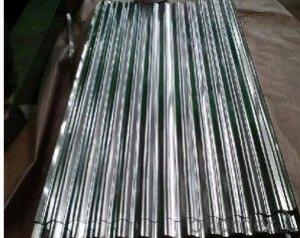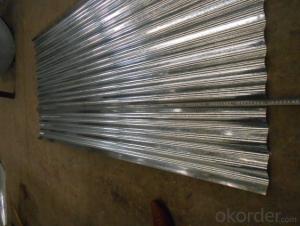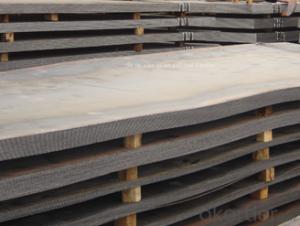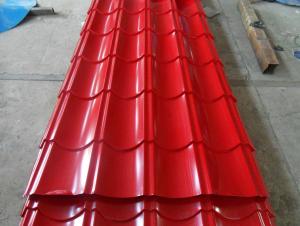HOT SALES CORRUGATED STEEL SHEET
- Loading Port:
- China Main Port
- Payment Terms:
- TT OR LC
- Min Order Qty:
- -
- Supply Capability:
- -
OKorder Service Pledge
OKorder Financial Service
You Might Also Like
Standard | AISI, ASTM, BS, DIN, GB, JIS, etc |
Grade | SGCC, DX51D, DX53D, DX54D, etc |
Thickness | 0.12-1.2mm |
Width | After Briquetting: 790-1025mm |
Waves | 8-15 |
Length | 1000-6000mm |
Zinc Coat | 60g/m2-180g/m2 |
Basic info | roofing sheet is made up of galvanized steel coil or ppgi and other metal steel sheet after rolling cold bending into a variety of wave type pressure sheet. |
Advantage | a.) Attractive and innovative appearance, rich colors, decorative, flexible combination b.) Light weight, high mechanical properties; c.) Anti-earthquake, fire, rain, long life, no maintenance; d.)Installation is simple,shorten the construction period; e.) Environmental protection, etc. |
Application | a.) Industrial and civil buildings, warehouse; b.) Steel structure houses and roof, walls, and decoration, etc. |
- Q:Can steel sheets be used for electrical grounding?
- Yes, steel sheets can be used for electrical grounding. Steel is a good conductor of electricity and can effectively dissipate electrical charges into the ground, making it a suitable material for grounding applications.
- Q:Are steel sheets suitable for pharmaceutical or cleanroom applications?
- Yes, steel sheets are suitable for pharmaceutical or cleanroom applications due to their durability, resistance to corrosion, and ease of cleaning. Additionally, steel sheets can meet the stringent hygiene and cleanliness requirements necessary in these industries.
- Q:What are the applications of steel sheets?
- Steel sheets have a wide range of applications due to their durability, strength, and versatility. They are commonly used in construction for roofing, flooring, and wall cladding. Steel sheets are also used in manufacturing processes for automobiles, appliances, and machinery. Additionally, they are utilized in the production of containers, pipes, and furniture. Overall, steel sheets find extensive use in various industries due to their excellent mechanical properties and ability to withstand harsh conditions.
- Q:The difference between steel edge sealing strip and steel plate putty water stop belt
- The good bonding between galvanized steel sheet and concrete makes the waterproof performance better. The utility model relates to a steel edge rubber water stop strip, which is characterized in that a water stopping product is adopted, which adopts a non equal thickness structure, a strong strength area and a waterproof zone, and makes the parts of the utility model be uniform and reasonable in force. The utility model relates to a steel edge rubber water stopping strip, which is additionally provided with an installation hole and is connected with the steel bar. The utility model has the advantages of firm fixation, easy displacement, and uniform and reasonable force for each part. When the utility model is in construction, the clamping surface of the clamping plate of the utility model is large and is not easy to be dislocated; the steel plate is additionally provided with an installation hole and is connected with the steel bar; the utility model has firm fixation and is not easy to displace. Good adhesion between galvanized steel sheet and concrete, and steel rubber stop makes waterproof better. A waterproof products produced by our factory in the buried steel edged waterstop is combined to galvanized steel and natural rubber raw material consisting of a rubber body material, it adopts the aging of natural rubber and excellent antioxidant performance, with strong self adhesive; high temperature in summer has no flow, low temperature in winter not the crisp; and has excellent water resistance, acid and alkali resistance and aging resistance; long service life, the product itself is non-toxic, the characteristics of a good environment.
- Q:What are steel sheets used for?
- Steel sheets are commonly used for various applications such as construction, manufacturing, automotive, and aerospace industries. They are utilized in building structures, roofing, cladding, and fabrication of machinery, equipment, and vehicles. Additionally, steel sheets can be used for making appliances, electrical enclosures, storage tanks, and many other industrial and commercial purposes.
- Q:What is the cost of steel sheets compared to other metals?
- The cost of steel sheets can vary depending on various factors such as the type of steel, thickness, size, and market conditions. However, in general, steel sheets tend to be more affordable compared to other metals such as titanium or gold while still offering excellent strength and durability.
- Q:How do steel sheets resist fire?
- Steel sheets resist fire due to their high melting point and excellent heat conductivity. When exposed to fire, the steel sheets absorb and conduct heat away from the source, preventing the temperature from rising to a critical level where the steel would weaken or melt. Additionally, steel does not combust or release toxic gases when heated, further enhancing its fire resistance.
- Q:Can steel sheets be used for electrical conductivity applications?
- Typically, steel sheets are not employed in electrical conductivity applications. Although steel exhibits decent heat conductivity and some electrical conductivity, it is not as efficient as specialized materials like copper or aluminum, which are specifically designed for electrical conductivity. Steel sheets find common use in domains that prioritize strength, durability, and corrosion resistance, such as construction, automotive manufacturing, and industrial equipment. In electrical conductivity applications, it is more prevalent to utilize materials with heightened conductivity, such as copper or aluminum, as they possess lower resistance and are better equipped to efficiently conduct electricity.
- Q:How do steel sheets perform under heavy loads or pressure?
- Steel sheets are known for their exceptional strength and durability, making them highly resistant to heavy loads or pressure. Due to their composition and manufacturing process, steel sheets possess a high tensile strength, which allows them to withstand substantial amounts of force without deforming or breaking. This property makes steel sheets ideal for applications where heavy loads or pressure are involved, such as construction, transportation, and industrial machinery. Additionally, steel sheets have excellent load-bearing capacity, meaning they can distribute the applied pressure evenly across their surface, minimizing the risk of structural failure or damage. The ability of steel sheets to perform under heavy loads or pressure is further enhanced by their rigidity, which prevents them from bending or buckling, ensuring the integrity of the structure or equipment they are supporting. Overall, steel sheets are a reliable and robust choice when it comes to handling heavy loads or pressure, making them a popular material in various industries.
- Q:What is the difference between a galvanized and aluminum steel sheet?
- To protect carbon steel from corrosion, a layer of zinc is applied to create a galvanized steel sheet. This process, called galvanization, involves immersing the steel in molten zinc, which forms a protective coating on the surface. Galvanized steel sheets are highly durable and act as a barrier against moisture, chemicals, and other corrosive elements. They find wide use in construction, automotive, and industrial sectors. Contrarily, aluminum steel sheets are produced from lightweight and corrosion-resistant aluminum. Rolled from aluminum ingots, these sheets come in varying thicknesses. Even without additional coatings or treatments, aluminum sheets offer exceptional resistance to corrosion. They are commonly employed in aerospace, transportation, and architectural applications. When it comes to differences, the key distinction between galvanized and aluminum steel sheets lies in their composition and protective properties. Galvanized steel sheets possess a zinc coating, which provides superior corrosion resistance compared to plain carbon steel. This makes them more suitable for outdoor and high-moisture environments. Moreover, galvanized steel sheets can be easily welded and painted, allowing for greater customization. In contrast, aluminum steel sheets have inherent corrosion resistance due to the presence of aluminum. They are lighter in weight than galvanized steel sheets, making them a preferred choice for applications that prioritize weight reduction. Aluminum sheets also exhibit better thermal conductivity and reflectivity properties, making them ideal for applications that involve heat dissipation or insulation. To summarize, galvanized steel sheets are carbon steel sheets protected by a layer of zinc to enhance corrosion resistance, while aluminum steel sheets are made from aluminum and offer inherent resistance to corrosion. The choice between galvanized and aluminum steel sheets depends on specific application requirements, such as the level of corrosion protection needed, weight considerations, and desired thermal properties.
1. Manufacturer Overview |
|
|---|---|
| Location | |
| Year Established | |
| Annual Output Value | |
| Main Markets | |
| Company Certifications | |
2. Manufacturer Certificates |
|
|---|---|
| a) Certification Name | |
| Range | |
| Reference | |
| Validity Period | |
3. Manufacturer Capability |
|
|---|---|
| a)Trade Capacity | |
| Nearest Port | |
| Export Percentage | |
| No.of Employees in Trade Department | |
| Language Spoken: | |
| b)Factory Information | |
| Factory Size: | |
| No. of Production Lines | |
| Contract Manufacturing | |
| Product Price Range | |
Send your message to us
HOT SALES CORRUGATED STEEL SHEET
- Loading Port:
- China Main Port
- Payment Terms:
- TT OR LC
- Min Order Qty:
- -
- Supply Capability:
- -
OKorder Service Pledge
OKorder Financial Service
Similar products
New products
Hot products
Related keywords





























